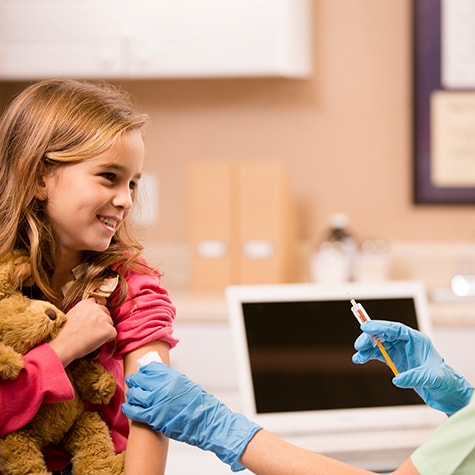Why Everyone Needs a Flu Shot
It is as important as ever for everyone over 6 months old to get a flu immunization by the end of October because the flu virus circulates more in the fall and winter months.
In short, very.
There are many different strains of the influenza virus. Every year, experts work to predict the strains that will be circulating in the community. Because some flu virus strains change from year to year, it is important to get the best protection each year with an updated flu vaccine.
Flu can lead to serious infections, like pneumonia, as well as other complications. “Flu season can be unpredictable, so it is important to get a flu immunization to be protected before the flu virus infections are in the community,” says Andi Shane, MD, MPH, System Medical Director, Infectious Diseases. “The best way to protect yourself and your family from the flu is for everyone 6 months and older to get a seasonal flu vaccine as soon as they become available.” Making sure that everyone who is eligible to be vaccinated receives flu vaccine is one of the best ways to keep your family healthy.
“It’s safe to get both a COVID-19 and a flu vaccine at the same time. Some parents worry about side effects, but if these occur, they are mild,” said Dr. Shane, “We have data that receiving both vaccines at the same time also results in good protection.”

Getting a yearly flu vaccine is one of the best ways to protect everyone.
Flu shots:
- Reduce the chance of getting the flu and of having a severe flu infection.
- People who get a flu vaccine have fewer days of symptoms, less severe symptoms and are less likely to need medical care.
- Flu vaccination decreases hospitalizations, as well as serious illness and death from the flu.
- Protect pregnant mothers and infants in the family.
- A 2018 study showed that getting a flu shot reduced a pregnant woman’s risk of being hospitalized with the flu by close to half.
- Not only does getting a flu vaccine during pregnancy help protect expectant mothers, a flu vaccine during pregnancy also helps to protect babies from flu infection for the first 6 months after birth (during the time that babies are too young to be vaccinated).
- All caregivers, friends and family members who will come into contact with you and your infant should be vaccinated. This practice, called cocooning, is a way to help protect vulnerable babies from flu and other vaccine-preventable diseases before they are old enough to be vaccinated.
- Help protect other kids and adults who have chronic medical conditions or have compromised immune systems.
- Flu vaccination helps reduce everyone’s risk of becoming ill, including those who have medical conditions, like asthma, diabetes or immune systems that do not fight viruses well.
- Are safe and protect children.
- There’s been a lot of experience with the safety of the flu vaccine. You cannot get the flu from the flu shot—the flu viruses in the flu shot are not active and cannot become active.
- People who feel bad after getting a flu shot are experiencing their body’s immune response to the inactive flu viruses in the shot. This is how the body builds immunity and prepares to fight active flu viruses in the future.
- An allergic reaction to the flu vaccine is incredibly rare. In the past, having an egg allergy was a reason not to get a flu shot, but this is no longer true. All children 6 months and older, including those with egg allergies, should receive an annual flu vaccine. Check with your child’s pediatrician or allergist if you have questions about your child’s allergy.

Schedule your vaccine today.
It’s not too late to protect your family. Talk to your child’s pediatrician about getting a flu shot.
Helping Parents Take On Flu Season
Andi L. Shane, MD, MPH, MSc, is Medical Director of Infectious Diseases at Children’s Healthcare of Atlanta. Dr. Shane completed an Epidemic Intelligence Service (EIS) fellowship at the Centers for Disease Control and Prevention (CDC) and a pediatric infectious disease fellowship at the University of California San Francisco. Dr. Shane has broad experience and interests in the field of pediatric infectious diseases and is committed to the care of children with infections with special pathogens in protected care environments working with children’s hospital preparedness teams.
This content is general information and is not specific medical advice. Always consult with a doctor or healthcare provider if you have any questions or concerns about the health of a child. In case of an urgent concern or emergency, call 911 or go to the nearest emergency department right away. Some physicians and affiliated healthcare professionals on the Children’s Healthcare of Atlanta team are independent providers and are not our employees.
Contact Us 404-785-KIDS (5437)



